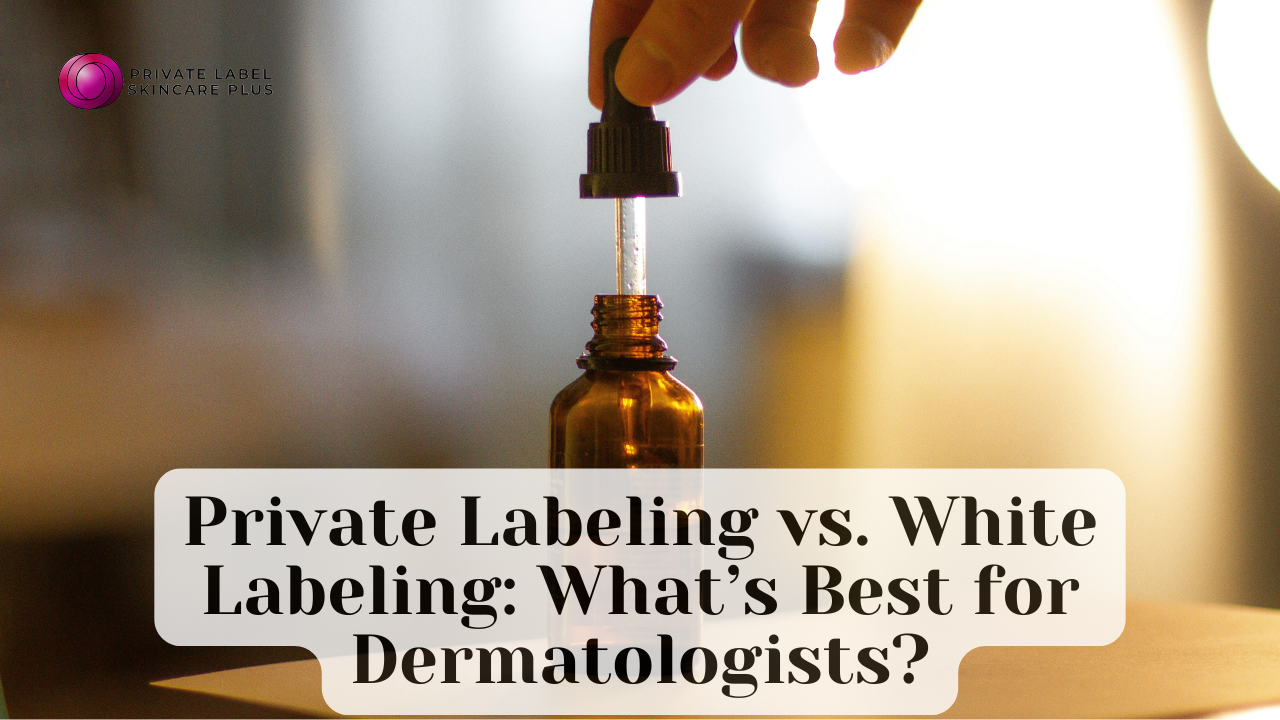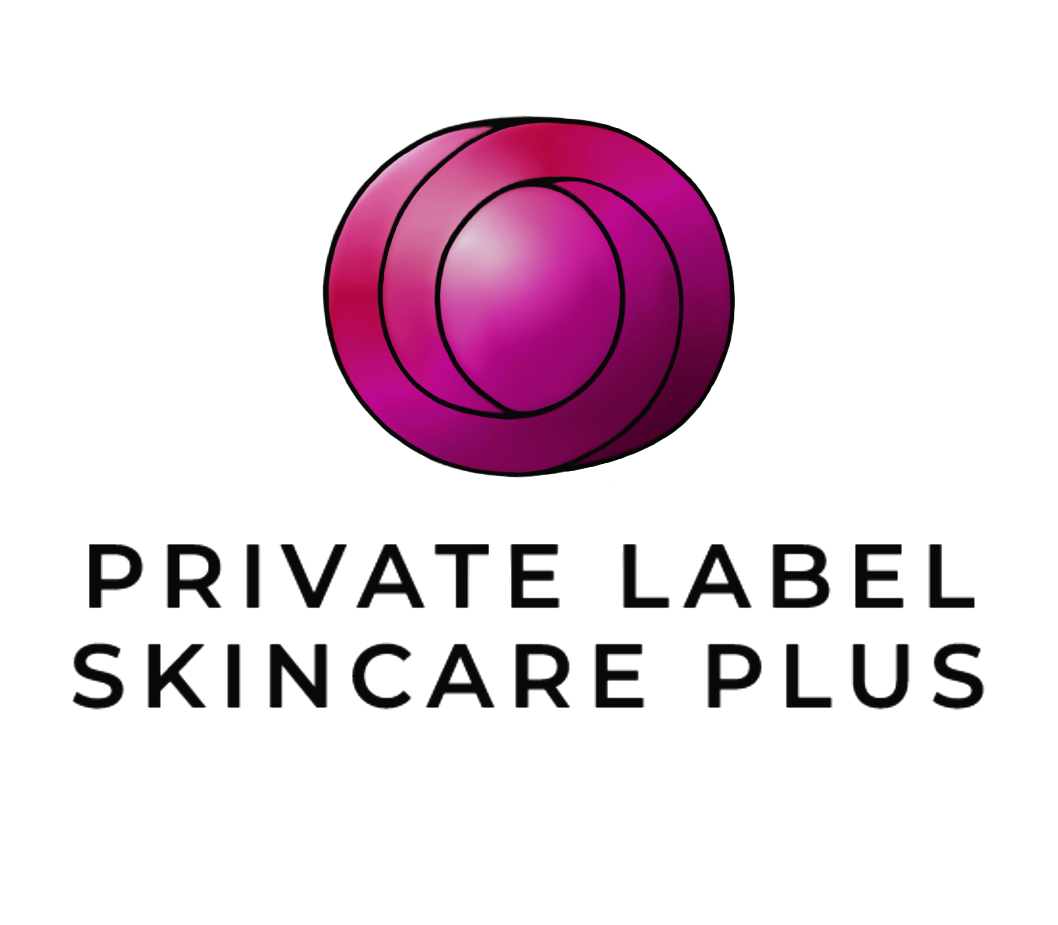In a changing skincare landscape, many dermatologists are having the opportunity to become entrepreneurs rather than just the clinician’s, In a time of higher demand in skincare with a focus on science-based, results-driven product formulations, dermatologists have more opportunities to create their own branded skincare products. However, one question stands in the way of many seeking to establish a skincare line: Which is the best option; private labeling vs white labeling?
Both options have their distinct advantages and disadvantages. Knowing these differences can help dermatologists to determine an effective approach and strategic course of action aligning with practice philosophy, brand vision, and expectations of clients.
This article will examine the subtle differences between private label and white label strategies with skincare products and consider which is the most prudent for dermatology product labeling working to develop a long-term presence in the cosmeceutical landscape. Let’s begin with the basics first.
Understanding the Basics
What is White Labeling?
White labeling is when you purchase pre-formulated and ready-to-sell skincare products from a manufacturer and brand them as your own. These white label products are uniform, meaning that there are likely many brands selling the same formulation with their own packaging and labels.
Key Features of White Labeling:
- The products are already developed and tested.
- No long turnaround time.
- Relatively low upfront investment.
- Limited or no customization.
- A shared formulation with many brands.
While comparing private labeling vs white labeling, the latter is a great fit for dermatologists wanting low-barrier entry into the skincare business. Especially if they just want a way to test the waters for market demand or a simple, minimal line.

What is Private Labeling?
Private labeling, on the other hand, involves customizing formulations and creating skincare products for your brand specifications. You may purchase a base formulation from the manufacturer, but this formulation can be modified as you wish in regards to ingredients, concentrations, fragrance, texture, etc.
Key Features of Private Labeling:
- Custom formulations.
- Increased skincare brand control over ingredients and effectiveness.
- Proprietary to your brand (not available to others).
- Longer for development and approval.
- Higher upfront cost.
Private label customizations are a great option for dermatologists who want to create a distinction from their brand, a specific treatment, and formulate proprietary products based on their clinical experience.
Comparative Analysis: Private Labeling vs. White Labeling
Let’s evaluate both dermatologist product options based on the following critical dimensions:
1. Brand Identity and Exclusivity
White labeling can provide very little brand distinction; the same formulation is sold under various labels, where the only distinction is packaging and design. Private labeling provides dermatologists with the opportunity to build a curated collection that reflects their personal philosophy. Their practice-related expertise and their clinical experiences with certain skin conditions.
The products created feel like an authentic extension of clinical philosophy and identity. If brand exclusivity and long-term brand equity is very important, private labeling is a better and more sustainable option.
2. Control On Formulation and Efficacy
In regard to product formulations, dermatologists will have no input or control with white labeling. A standard pitch point with white labeling is that the fixed formulations can be frustrating, especially for those dermatologists who want to lock active ingredients with treatment protocols or patient sensitivities. Private labeling, on the other hand, allows total flexibility to produce evidence-based products, change concentrations, and cover niches (post-procedure, acne, hyperpigmentation).
So it is easy to conclude in a debate of effectiveness of private labeling vs white labeling for those looking for precision and credibility with efficacy, private label is the obvious choice.
3. Time to Market
White labeling wins when speed is a priority. Once packaging and branding are finalized, products can hit clinics or e-commerce platforms within a matter of weeks, making it ideal for those looking for quick entry into the market. Private labeling demands a longer timeline, involving research and development, sampling, patch testing, stability testing, compliance checks, and multiple formulation adjustments.
While more time-consuming, private labeling’s longer setup is a worthwhile investment for dermatologists who are committed to establishing a strong, differentiated brand.
4. Regulatory and Compliance Flexibility
While white-labeled products adhere to most basic over-the-counter compliance requirements, they allow for one-off compliance on particular claims – “dermatologist tested” or “non-comedogenic”, etc., but not for other certifications, like cruelty-free. Private labeling allows exploring third-party testing, targeted certifications, and completely brand-centric labeling, in conjunction with compliant but regulatory approval, and which potentially allows for clinical claims written by clinicians.
For clinics and dermatologists, private labeling allows legitimacy and full transparency with patients built into a customizable compliance model.
5. Cost and Investment
If you’re looking at the cost aspect, white labeling is clearly the more economical option. Choosing white label fulfillment (which has minimal development, testing, very low minimum order quantities) is appealing to dermatologists who are just trying things out or working with small budgets. However, private labeling requires a direct investment where upfront R&D, testing, and certifications come at an expense, and MOQs are higher based on the complexity of the product.
But for those who have a longer-term perspective and want to invest, private labeling is worth the upfront cost for increased future profitability and brand loyalty as it grows.

6. Innovation & Scale
Regarding innovation, white labeling does not offer any real opportunity for creativity or responsiveness to new trends, since it is based entirely on manufacturer formulations that exist. On the other hand, private labeling means that dermatologists can lead with innovation, customize their products based on the collaborative nature of trends. This includes areas like microbiome skincare, barrier repair, or high-active serums, while also allowing a keen focus on their patient demographics.
For ambitious brands and clinics, or those planning for future growth and market leadership, private labeling represents the foundational importance of both innovation and scale.
Scenario-Based Recommendations for Dermatologists
Let’s break it down further depending on your goals and stage of practice in dermatology for private labeling vs white labeling:
1. You Are Launching Your First Skincare Line:
- You’ll want to start with white-labeling.
- Test the waters and see what patients respond to.
- You need to keep it simple and stick with the essentials (cleanser, sunscreen, moisturizer).
2. You Have Your Established Patients And Area Known For Niche (e.g. Acne, Aesthetics, Pigmentation):
- You can proceed with private-labeling.
- Create a specific formulation to make it your practice focus.
- This legitimizes your brand and improves trust and repeat purchase behavior.
3. You Want a Retail/E-Commerce Extension of Your Clinic:
- Start with white-labeling for speed and value.
- Transition to private-labeling as your brand grows and you learn more about your customers.
4. You want to Eventually Distribute Beyond Your Clinic (salons, pharmacies, selling on online marketplaces).
- In this instance, you will want to do private-labeling, so your product can have unique identities that won’t be confused with other generic white-label formulations that may appear elsewhere.
Private Label Benefits Unique to Dermatologists
- Medical Expertise Differentiation: You can create customized formulations based on actual clinical observations and results, which a typical beauty brand cannot provide.
- Trust Factor: Patients are more likely to trust and buy products developed by their doctor than off-the-shelf cosmetics from their local Sephora or department store.
- High Ticket Pricing Power: Customized formulations enable high-end pricing, and places your brand closer to clinical grade.
- Increased Patient Compliance: Patients are more likely to comply with their skincare treatment if the doctor prescribes a customized in-house product.
Challenges to Be Aware Of
Regardless of the method in private labeling vs white labeling, as with most things in life, there can be difficulties when using models, such as:
With white labeling, there is potential branding dilution and perceived comparisons to similar products. Whereas with private labeling, it will require many more hours of your time, and you will need to decide every element and detail, while also making sure you are not overextended.
While these challenges can be daunting, we can help you navigate through them the right way with the best manufacturing partner, marketing strategies, and educating patients.
Conclusion: What is Right for Your Practice?
Be it any from private labeling vs white labeling, both models offer dermatologists a solid approach to adding valuable methods to their business. The right model for you will depend on where you are at within your practice, your business objectives, and involvement in product development.
If you want to get to the market quickly with minimal risk, then white labeling is a smart option. If you want to create a unique and meaningful brand that patients will want, and is positioned around clinical science, private labeling is a better choice.
So, whether you are simply curious and want to test the waters or if you are ready to start your own customized skincare line, we are here to assist you. We love working with dermatologists, and can help from picking the right business model, to your customization and product development, branding and full-audit of your ideas.


